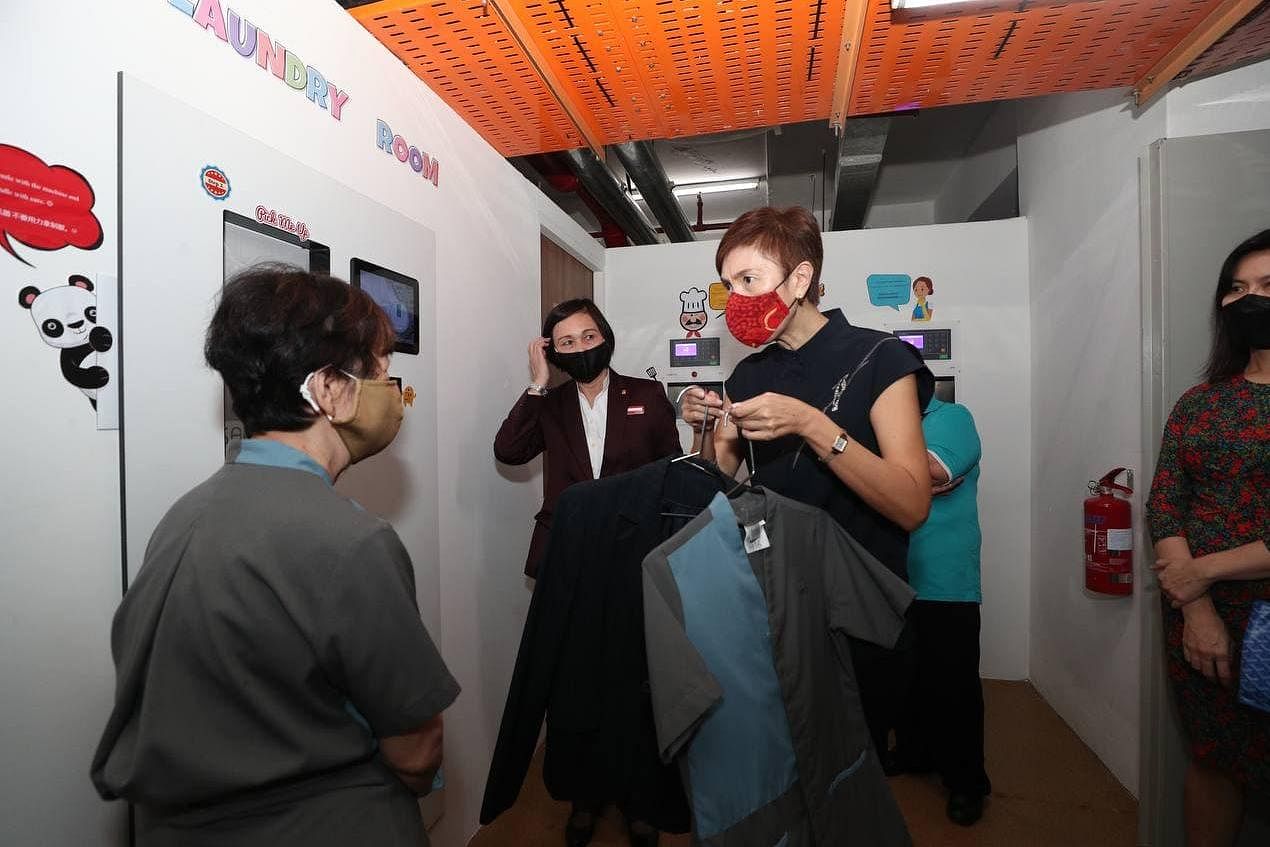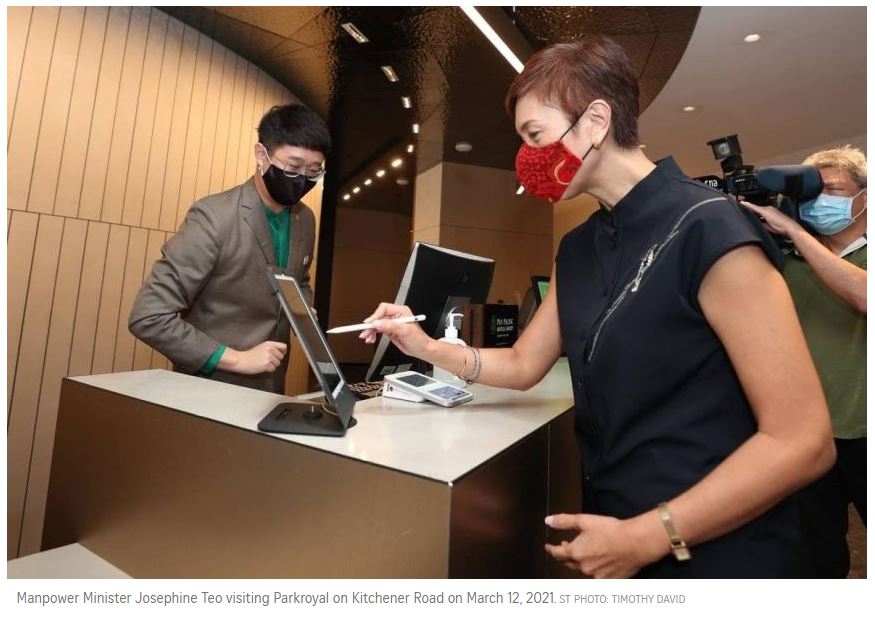Singapore’s hard-hit hotel industry to get more support with revamped job redesign scheme
SINGAPORE – In a hotel in the future, front office staff will be experts in tailoring personalised tour itineraries, while housekeepers will be able track room cleanliness using mobile applications and robots are used for cleaning.
In the kitchen, chefs will be proficient in food waste management and sensors will track stock levels.
This is the vision for the Covid-19 battered hotel industry in Singapore, thanks to a revamp of the Job Redesign Reskilling (JRR) Programme.
The revamp was announced by the Workforce Singapore (WSG) on Friday (March 12), along with the release of the 19th edition of the jobs situation report.
Sixteen job roles, which would require tech know-how, have been identified. These include rank-and-file positions such as guest experience designers and food and beverage ambassadors, as well as professionals such as managers, executives and technician roles from technician sustainability specialists to human resource generalists.
Hotels looking to participate in the revamped programme must offer job redesign projects that involve the adoption of technology.
Previously, the programme was open to all job roles and covered three types of job redesign projects: cross-functional redeployment, creation of new roles and technology adoption.
With the revamp, hotels can tap pre-approved training plans. In addition, workers whose jobs are being redesigned have to go through a minimum six days of external classroom training, on top of up to 54 days of on-the-job or in-house classroom training.
Previously, hotels had to propose their own training plans. Staff were also not required to go for external classroom training, and could pick up skills through on-the-job training.
Under the revamped programme, for a start, 200 hotel workers can look forward to enhanced careers, said WSG. The JRR programme was introduced in November 2019 to help hoteliers train existing workers to take on re-designed job roles.
WSG chief executive Tan Choon Shian said: “Despite the deep impact of Covid-19, the hotel industry has remained resilient, adaptive and a key part of Singapore’s economy and workforce.”
Hotels that have implemented new technology or systems in the past year or are looking to do so in the coming months can tap the revamped programme to support their efforts. They can receive up to 90 per cent of the course fee funding and salary support for the duration of training, capped at three months.
The JRR programme was revamped by the WSG, as well as the Singapore Hotel Association (SHA), the Singapore Tourism Board (STB) and the Food, Drinks and Allied Workers Union (FDAWU).
FDAWU president Julie Cheong said: “Companies will get more resources to transform, workers will enjoy better work prospects and have more opportunities in the hotel industry to work towards.”
Ms Kwee Wei-Lin, president of the SHA, said raising productivity through the digital transformation of the hotel scene had already been under way, but the progress has accelerated with the pandemic.
Since the JRR programme rolled out about two years ago, more than 1,400 workers from over 55 hotels have undergone reskilling and embarked on new or enhanced roles.
This has helped overcome the manpower crunch in some hotel functions and excess manpower in others during the pandemic.
STB’s director of hotel and sector manpower, Ms Tan Yen Nee, encouraged more hotels to participate, so that they could “continue to attract and retain talents by offering meaningful and sustainable hotel careers to Singaporeans”.
Help for over 10,000 employers

More than 10,300 employers received help from placements through WSG programmes and career matching services last year, with 90 per cent of them being small and medium-sized enterprises (SMEs).
This is a 45 per cent increase from 2019, Manpower Minister Josephine Teo told reporters after a visit to Parkroyal on Kitchener Road.
About half of the employers that received help were from 10 sectors: construction, education, financial services, food services, infocomm technology and media, logistics, precision engineering, professional services, retail and wholesale trade.
To help meet the changing manpower needs of employers, WSG and its partners have increased outreach activities, expanded career conversion programmes and introduced job transformation schemes.
The ramping up of the career conversion programmes for mid-career hires has seen over 1,500 employers benefitting, or a 10 per cent increase compared with 2019, said the Ministry of Manpower and WSG in the latest jobs situation report. Launched last August, the report typically focuses on sectors with hiring demand.
Last year saw about 140 – or about a 20 per cent rise in – outreach events to help employers access a bigger pool of talent. These included virtual and physical career fairs and interviews.
The report also noted that more than 35,600 employers actively posted on the MyCareersFuture job portal last year, a 54 per cent increase from 2019.

Nearly 350 employers received support in their job transformation efforts through schemes such as Job Redesign Reskilling Programmes.
The latest report also highlighted strategies employers could put in place to boost their manpower efforts, as well as the avenues implemented by MOM and WSG to help them overcome hiring challenges.
For a start, employers can look beyond job seekers that have the full set of requisite skills for a job and invest in the skills top-up of workers, the report said. They can tap government training schemes, such as the career conversion programmes and SGUnited Traineeships, that would allow them to expand the pool of recruits, including mid-career individuals.
Employers can also redesign job roles, so that they become meaningful careers that offer clear progression pathways.
To get better responses from job applicants, employers can rethink their job descriptions, such as stating upfront the training provided to bridge skills gaps and highlighting the company’s culture, including any flexible working arrangements.
IT services and solutions provider Nibaara Technologies has put in place programmes to train professionals with little experience in niche areas such as artificial intelligence and machine learning, and hire them as full-time employees.
Managing director Balachandar Thyagarajan said the company believed in investing in local talent.
“This not only improves our ability to retain our workers in the long run, it also helps us overcome challenges in finding people with relevant experience in niche areas,” he said.
Source: https://www.straitstimes.com/singapore/jobs/revamped-job-redesign-scheme-to-aid-in-workforce-transformation-in-the-hotel-industry


 English
English




